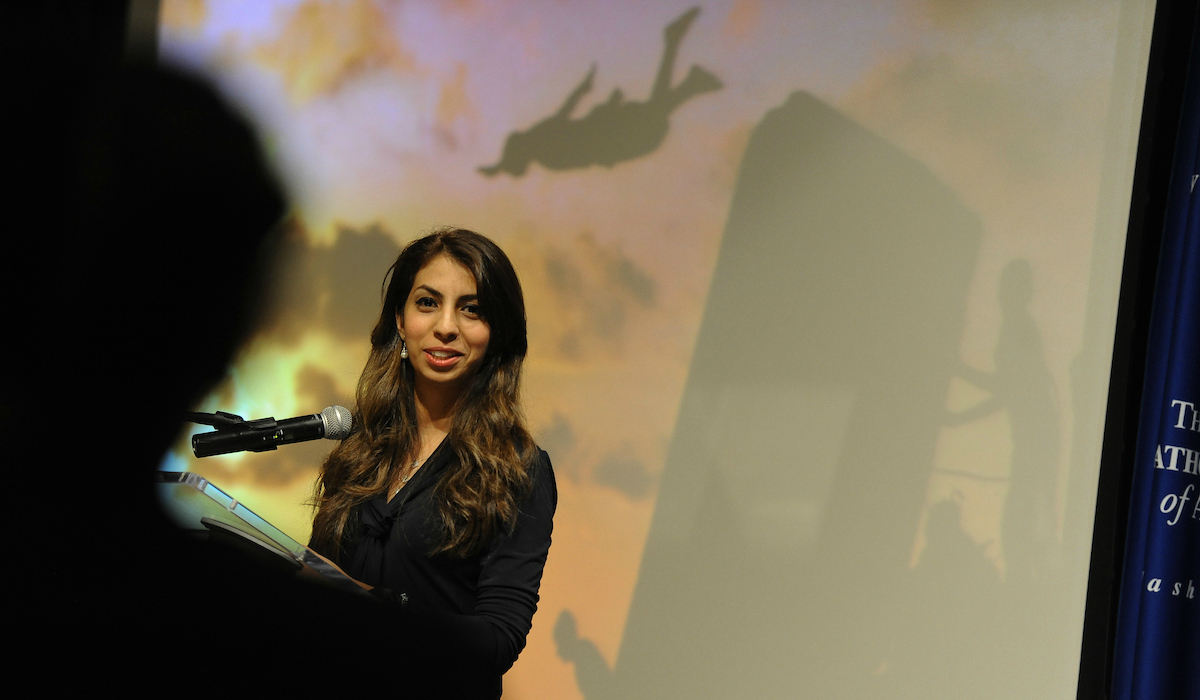November 04, 2016

“Don’t dream big, dream limitless.” That was the theme of the night, as award-winning photojournalist and activist Eman Mohammed delivered a presentation to students, faculty, and dignitaries on Nov. 1 in the Edward J. Pryzbyla University Center.
As one of just a few female photojournalists covering the Israeli-Palestinian conflict, Eman Mohammed has been published in
The Guardian,
The Washington Post, VICE, and
Mother Jones, among other global publications.
Great Room B was hushed as Mohammed recounted her experience from behind the camera lens. With her photos displayed on a large screen, she talked about the numerous casualties of war and detailed the loss that extends beyond the carnage: emotional damage, local destruction, and the aura of uncertainty in a war zone.
She noted that her work covering the conflict in the Gaza Strip is not rooted in uncovering the darkness of history or humanity, but rather in seeking out the stories of survival — the existence of humanity in the face of adversity.
Mohammed has been recognized by several international organizations, her works have been acquired by the British Museum in London, and, as of 2014, she has been honored as a TED fellow. Her talk was sponsored by Catholic University’s Arabic Club and several other student organizations.
In her work, she has revealed the hidden accounts of survivors, focusing her lens on those left after the rockets are fired as they endure amid the rubble of their prior lives. She said she attempts to show the essence and pureness of humanity in a region otherwise desecrated by war.
“You are never prepared to face war, even if you are born in a war zone,” said Mohammed. “I don't work by the rules of photojournalism, nothing defines you in war, only the people who tell you their stories ... they are the original story tellers.”
Palestinian by birth and herself a refugee of Gaza, Mohammed also talked about what she described as the “structures of oppression” that exist within Palestine. She said that prior to her foray into photojournalism she was partially blind to those structures. But through her work, she said she began to understand that Palestine’s internal issues are all interrelated and must be viewed through a more nuanced lens.
Mohammed cited education and athletics as tools for countering the systems that restrict women in Palestine. Rather than challenging the standing system outright, she suggested that, through many small victories, a larger goal would be met. In a personal aside, she acknowledged that initially she was seeking recognition in her field, but she realized that her work speaks for itself and it is the stories of Gaza that matter.
Her past notably influential in her work, Mohammad said, “I was born robbed. My decent life was taken away at the very beginning. It was a privilege; sometimes it was afforded, sometimes it wasn't.” A testament to survival, Mohammad uses her craft to lift survivors out from under the rubble, revealing stories hidden under layers of untold pasts.
SaveSaveSaveSave

